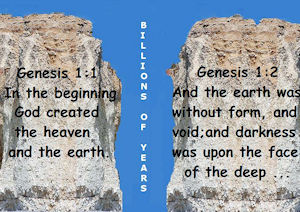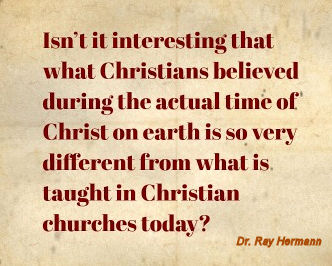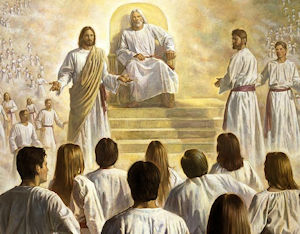For a moment, let us speculate about something on the fringe of biblical knowledge. Unlike other animals, God Almighty gave humans a brain with the unique ability to construct logical possibilities, so let’s do that. Since it is good to expand our opinions and think ‘outside the box’ once in a while, we will call this a mental exercise for considering facts unknown. You may think this is an odd way to start a bible study, but hang-in for a short time because there is a biblical lesson here.
Listen to this article: Click the > button to start audio – click again to pause – click the speaker icon to mute. Adjust volume on the right side.
You probably have heard about a theory that pre-human or pre-Adamic people once lived upon earth. This of course implies an educated and somewhat advanced civilization lived here before the time of Adam and Eve. Most people believe this is a new-age concept, but that is not true, for there is written reference to this idea as far back as 170 AD, and even earlier hints have been found in Jewish literature.1 Furthermore, in Augustine’s2 philosophical treatise The City of God, there is reference that Egyptians believed their collective wisdom dated back 100,000 years.3
 A more recent idea, called the ‘Gap Theory’, was very popular in the early twentieth century and is suggested in The New Scofield Reference Bible.4 This theory supposes a gap between two separate earthly creations mentioned in verses 1 and 2 of Genesis, chapter one. Basically, it states the earth was created, then later something happened to cause it to become void, dark, and without form. After more time passed, the creation as mentioned in the Bible began. A popular biblical teacher, Chuck Missler,5 taught about this gap in his sermons and public talks.
A more recent idea, called the ‘Gap Theory’, was very popular in the early twentieth century and is suggested in The New Scofield Reference Bible.4 This theory supposes a gap between two separate earthly creations mentioned in verses 1 and 2 of Genesis, chapter one. Basically, it states the earth was created, then later something happened to cause it to become void, dark, and without form. After more time passed, the creation as mentioned in the Bible began. A popular biblical teacher, Chuck Missler,5 taught about this gap in his sermons and public talks.
(Verse 1) In the beginning God created the heaven and the earth.
(Verse 2) And the earth was without form, and void; and darkness was upon the face of the deep. And the Spirit of God moved upon the face of the waters (Genesis 1:1-2, Scofield KJV).6
Some people believe I taught against this theory, which is not really the case. When I once wrote about this possible pre-human hypothesis, it only concerned a particular mistranslated word, not the concept itself. While I did not write there could not have been earthly people created by God before Adam and Eve, I do lean more to the traditional tenet. But it is possible, I suppose, that some otherworldly intelligent life — physical and/or spiritual — could have colonized portions of this planet before the creation of Adam and Eve.
If those very ancient people or creatures were real, why doesn’t the Holy Bible speak of them? Well, the Bible is about the history of Homo sapiens7 and their creation and education by God. If there was ever a previous intelligent pre-human life-form living on this planet in the distant past, there is no reason to expect it to be listed within a historical document about humans.8
 But, it should not be deemed unreasonable to think God did create other intelligent life forms, both here and elsewhere, over an immense period of time. And although God can do anything alone, it is also reasonable to believe he accepts input of opinion and suggestions from his previous intelligent creations about how to proceed. After all, the universe is not only for God’s benefit, but it is also the universe of those whom he created to live in it.
But, it should not be deemed unreasonable to think God did create other intelligent life forms, both here and elsewhere, over an immense period of time. And although God can do anything alone, it is also reasonable to believe he accepts input of opinion and suggestions from his previous intelligent creations about how to proceed. After all, the universe is not only for God’s benefit, but it is also the universe of those whom he created to live in it.
We humans are now being educated in our journey to perfection. Once we have learned the technology to live on other planets and in other star systems, and develop the ability to travel between them, would it be unreasonable to think God might ask for our own input about newer worlds that are works in progress? As he stated in the Garden of Eden, we are expected to take care of this planet, so I believe some day in the future we will be expected to contribute to the care of other parts of the universe, as we extend our reach to the stars.
Enough! Now Stop this Crazy Talk.
God Almighty has probably already delegated portions of his creative process to other beings in various locations within our universe. If so, he would be something like a director or a chief executive officer. Okay, I’ll stop this crazy-talk here, but there are hints about this process in our Holy Bible and that is what we will examine and focus upon in this article.
The majority of church members — and most preachers, too — skip over such clues found in our Bible. The first such clue is also found in the first chapter of the first book of the Old Testament. In Hebrew this book is called Bereshith, meaning ‘in the beginning’, but Christians know it as the book of Genesis.9
The clue is found in the scripture which specifically states, “Then God said, ‘Let us make humankind in our image, according to our likeness’ . . . ” (Genesis 1:26a, NRSV).10 This is our first hint that others are included in the decision to create Adam and Eve. While the wording within the verse may differ in various translations, they all infer “let us make . . . ” and “in our image . . . ” and “after our likeness . . . ” So, who is God talking to?
Another interesting thought about this verse is the real meaning of the name ‘God’. The Scriptures11 is a literal translation from the original languages, and this is how it states the above verse: “And Elohim said, ‘Let Us make man in Our image, according to Our likeness’,” (Bereshith 1:26a, TS).12
 So, ‘God’ in this verse is actually translated from the original Hebrew Elohim, which means the plural ‘gods’ in an ordinary sense.13 This suggests it is possible that our Lord was speaking to a group of which he belonged. “And a simpler explanation is that ‘us’ reflects an announcement by the single God of Israel to a group in his presence — a heavenly host.”14 This host was probably the divine council of heaven, or at least a part of it. So, what is this council?
So, ‘God’ in this verse is actually translated from the original Hebrew Elohim, which means the plural ‘gods’ in an ordinary sense.13 This suggests it is possible that our Lord was speaking to a group of which he belonged. “And a simpler explanation is that ‘us’ reflects an announcement by the single God of Israel to a group in his presence — a heavenly host.”14 This host was probably the divine council of heaven, or at least a part of it. So, what is this council?
One biblical scholar, the late Michael Heiser,15 wrote that all entities called elohim in the Old Testament “have one thing in common: they are by nature not part of the world of humankind, a world of ordinary embodiment.” The term elohim also “describes residence — it identifies the proper domain of the entity described by it.” That includes Yahweh (YHWH, LORD, or Jehovah, in some translations), and lesser gods, angels, etc. which are all rightful inhabitants of the spiritual world. This spiritual world, like our human world, has creatures of different rank and power. This heavenly host or divine council manages the affairs of heaven and earth under the authority of Yahweh, known in the Bible as the God of Israel.16
Other biblical academics have slightly different thoughts, some saying that “Jesus pre-existed as one of two ruling Yahwehs. It was Yahweh the Son who made visible appearances, whereas Yahweh the Father was always the invisible God.” As an example, it was Yahweh the Son who appeared to Abraham and other patriarchs. Yahweh the Son created all things by direction of Yahweh the Father, so it was the Father who was speaking to the Son when it was said, “Let us make humankind in our image, according to our likeness.”17
First, bear in mind that the term “our image,” suggests that the emphasis of the image was not physical, but that humans were to be like God with the attributes of creativity, decision making, compassion, and love.18 And second, bear in mind that it was Yahweh the Son that was born as a human baby by way of the virgin Mary.
 During the Second Temple historical period (516 BC – 70 AD), Jewish intellectuals thought of two powers as heavenly rulers — one visible and one invisible. One was the supreme God of Israel, while the other was subordinate to him. And the early Christians accepted this idea and considered Jesus as the second Yahweh, subordinate to the Almighty. These Jewish converts to Christianity worshiped both the God of Israel and Jesus of Nazareth, which combined were thought to be the two powers of the Jewish thinkers.19 Isn’t it interesting that what Christians believed during the actual time of Christ on earth is so very different from what is taught in Christian churches today?
During the Second Temple historical period (516 BC – 70 AD), Jewish intellectuals thought of two powers as heavenly rulers — one visible and one invisible. One was the supreme God of Israel, while the other was subordinate to him. And the early Christians accepted this idea and considered Jesus as the second Yahweh, subordinate to the Almighty. These Jewish converts to Christianity worshiped both the God of Israel and Jesus of Nazareth, which combined were thought to be the two powers of the Jewish thinkers.19 Isn’t it interesting that what Christians believed during the actual time of Christ on earth is so very different from what is taught in Christian churches today?
According to Michael Heiser, “God’s heavenly dwelling was also his headquarters, the place where he met with his council, the members of the heavenly host who served him in the administration of his creations. This is the context for the plural language of Genesis 1:26. God created human beings to reflect his image (i.e., represent him) just as the members of his heavenly host did.”20
I have often said that an analogy may be made by looking at Yahweh’s position as similar to a corporate office staffed with a President-CEO (Almighty God) at the very top and a Vice President-Manager (Jesus) as the ‘second in command’. Down the administrative hierarchy would be angels and other spiritual beings. I know you may think this is like comparing apples to oranges, but you get the general drift of this idea.
The Divine Council of Heaven
Yes, there is a hierarchy of type, rank, power, and function: administrators, archangels, regular angels, fallen angels, watchers, and Satan himself are but a few. These participants of the heavenly host or divine council periodically convene to discuss things and make plans and carry out important decisions. There is evidence of this in the Bible, as well. Here are three examples.
(1) One day the heavenly beings came to present themselves before the LORD, and Satan also came among them. The LORD said to Satan, “Where have you come from?” Satan answered the LORD, “From going to and fro on the earth, and from walking up and down on it” (Job 1:6-7).
 (2) God has taken his place in the divine council; in the midst of the gods he holds judgment (Psalm 82:1).
(2) God has taken his place in the divine council; in the midst of the gods he holds judgment (Psalm 82:1).
(3) I saw the LORD sitting on his throne, with all the host of heaven standing beside him to the right and to the left of him. And the LORD said, “Who will entice Ahab, so that he may go up and fall at Ramoth-gilead?” Then one said one thing, and another said another, until a spirit came forward and stood before the LORD, saying, “I will entice him.” “How?” the LORD asked him. He replied, “I will go out and be a lying spirit in the mouth of all his prophets.” Then the LORD said, “You are to entice him, and you shall succeed; go out and do it” (1 Kings 22:19b-22).
The Hebrew scriptures (the older testament) take up the larger portion of the Bible, a full two-thirds.21 So there are also several other examples indicating God’s heavenly governmental administration in this historical record covering several thousand years. Many times the expressions carry a military significance, like ‘army of the skies’, or ‘angels for battle’, etc. It was “Israel’s belief in the Lord as the Creator of heaven and earth, the one who marshalled the heavenly bodies at his command and ordained them to perform a special function.”22 (See Nehemiah 9:6; Psalms 33:6; 103:21; 148:2; Isaiah 40:26; 45:12.)
While most biblical references of a heavenly host are in the Old Testament, the New Testament is not without comment of this arrangement. The best known Greek scripture indication of this heavenly group describes how they praised God when an angel announced the birth of Jesus to the shepherds in the field. “They served as a great choir of heavenly beings who glorified their Creator and participated in the background of the new age of salvation.”23
“And suddenly there was with the angel a multitude of the heavenly host, praising God and saying, ‘Glory to God in the highest heaven, and on earth peace among those whom he favors!’” (Luke 2:13-14).
Conclusion
How should we refer to this executive committee of our God: Divine Council, Heavenly Council, Heavenly Host? I don’t think it matters much, as long as we understand what it means and what function it performs. For myself, I know that ‘Divine Council’ refers specifically to the council of Yahweh, rather than just a group gathering of heavenly beings, so that is my preference.
I know these thoughts are a bit difficult to wrap one’s mind around, but give them some thought. They can help us view several parts of the Bible with a more logical understanding. This new look at scripture can help us fit the correct pieces of God’s creation puzzle into a beautiful picture of his plan.
The music selection for this study concerns our Lord’s birth on earth. It describes the scene of the heavenly host as portrayed in Luke, chapter 2. The song title is ‘Heavenly Hosts’ by Chase Oaks Worship, a music ministry group at Chase Oaks Church in Plano, Texas, USA. Selected lyrics are below and the music video is listed in References & Notes.24
 On this moonlit hill, alone
On this moonlit hill, alone
The stars fill my eyes
A strange and beautiful sight, ohhh
Then voices singing in the sky
Calling through the silent night
Bring me to my knees
Heavenly hosts cry glory, glory
For the Lord is with us
Let all the earth shout worthy worthy
Love has come to save us
Holy, Holy, Holy
Allelu, Alleluia
![]()
Copyright © 2023, Dr. Ray Hermann
OutlawBibleStudent.org
→ Leave comments at the end, after ‘References & Notes’.
Your email address will NOT be published. You can view our basic rules for comments by clicking “The Fine Print” on the top menu bar.
References & Notes
- Hermann, Ray, “Coming: An Awakening to a New Reality”, (The Outlaw Bible Student, OBS, 3 May 2022, https://outlawbiblestudent.org/coming-an-awakening-to-a-new-reality/
- St. Augustine (354-430 AD): a theologian and Christian bishop of Hippo (now Annaba, Algeria). He was a skilled preacher and prolific writer, best known for The City of God and Confessions.
O’Donnell, James, “St. Augustine”, (Encyclopedia Britannica, 20 July 1998), https://www.britannica.com/biography/Saint-Augustine/additional-info#history - “Pre-Adamite”, (Wikipedia, Wikimedia Foundation, 15 April 2022), https://en.wikipedia.org/wiki/Pre-Adamite
- Scofield, C. I., The New Scofield Reference Bible: Authorized King James Version, (New York: Oxford University Press, 1967).
- Chuck Missler (1934-2018): engineer and missile chief (TWA, U.S. Air Force), businessman (CEO/senior management, Western Digital, Helionetics, Ford Motor Co., Resdel Industries), Bible teacher (Koinonia House in NZ and USA), lecturer, and author (The Magog Invasion, Alien Encounters, Cosmic Codes, etc.).
“Chuck Missler”, (Wikipedia, Wikimedia Foundation, 14 December 2021), https://en.wikipedia.org/wiki/Chuck_Missler - Scofield, C. I., The New Scofield Reference Bible: Authorized King James Version. See above.
- Homo sapiens, (Latin: ‘wise man’): The scientific name for the species to which all modern human beings belong. Homo sapiens is one of several species grouped into the genus Homo, but it is the only one that is not extinct.
Tattersall, Ian, “Homo sapiens” (Encyclopedia Britannica, retrieved 20 March 2023), https://www.britannica.com/topic/Homo-sapiens - Hermann, Ray, “Genesis 1:28 – God tells Adam and Eve to ‘replenish’ the Earth. Was a previous civilization destroyed?” (The Outlaw Bible Student, OBS, 30 March 2019), https://outlawbiblestudent.org/genesis-128-god-tells-adam-and-eve-to-replenish-the-earth-was-a-previous-civilization-destroyed/
- Genesis: means ‘creation’ or ‘generation’, because it gives an account of the origin of all things, and contains the human history of 2369 years.
Easton, M. G., Illustrated Bible Dictionary and Treasury of Biblical History, Biography, Geography, Doctrine, and Literature, (New York: Thomas Nelson, 1893), p. 280. - Unless otherwise noted, all scripture is quoted is from The Holy Bible: New Revised Standard Version, (Nashville: Thomas Nelson Publishers, 1989). Used by permission.
- The Scriptures, 3rd edition, (Northriding, Republic of South Africa: Institute for Scripture Research, 2009).
- Ibid., (Bereshith [Genesis] 1:26a).
- Strong’s Hebrew word #430. אֱלֹהִים ˒ĕlôhı̂ym – gods in the ordinary sense, also used sometimes for the supreme God or gods; and sometimes as a superlative:— angels, great, judges, or mighty.
Strong, James, The New Strong’s Dictionary of Hebrew and Greek Words, (Nashville, TN: Thomas Nelson Publishers, 1996). - Barry, John D., et al., (Eds.), Faithlife Study Bible, (Bellingham, WA: Lexham Press, 2012, 2016), Ge 1:26.
- Michael Heiser, Ph.D. (1963-2023): was an author and professor of biblical studies. He also served as scholar-in-residence at Faithlife in Bellingham, Washington (Logos Bible Software/Lexham Press).
- Heiser, Michael S., “Divine Council” in Faithlife Study Bible, (Bellingham, WA: Lexham Press, 2016).
- “The Preexistence of the Messiah, Appendix A” in The Festivals and Sacred Days of Yahweh, (Garden Grove, CA: Qadesh La Yahweh Press, 2022), pp. 385-398. Also available online at —
https://www.yahweh.org/publications/fsdy/festivals.pdf
http://yahweh.org/publications/articles/preexistence/preexistence_messiah.pdf - Barry, John D. et al., (Eds.), Faithlife Study Bible, (Bellingham, WA: Lexham Press, 2012, 2016), Ge 1:26.
- Heiser, Michael S., “Old Testament Godhead Language” in Faithlife Study Bible, (Eds.), John D. Barry, et al., (Bellingham WA: Lexham Press, 2016).
- Heiser, Michael S., The Bible Unfiltered: Approaching Scripture on Its Own Terms, (Bellingham, WA: Lexham Press, 2017), pp. 185-186.
- Kim, David, “Difference Between Old and New Testament: With Simple Charts”, (Pursuit Bible, 26 December 2022), https://pursuitbible.com/difference-between-old-and-new-testament/#differences-between-the-old-testament-and-the-new-testament-chart
- Tolar, William B., in Baker Encyclopedia of the Bible, (Ed.) Walter A. Elwell, (Grand Rapids, MI: Baker Book House, 1988), vol. 1, p. 1006.
- Youngblood, Ronald F., et al., (Eds.), Nelson’s New Illustrated Bible Dictionary, (Nashville TN: Thomas Nelson Publishers, 1995), ‘Host of Heaven’.
- “Heavenly Hosts”, Artist: Chase Oaks Worship; ministry of Chase Oaks Church, Plano, TX, (uploaded on YouTube, 18 December 2021, no copyright or licensing information listed). Used under ‘fair use copyright’ for teaching under Section 107 of the United States Copyright Act of 1976 — MUSIC VIDEO: https://youtu.be/EWROAVtC-uA

